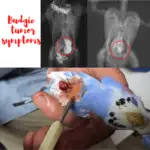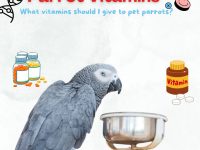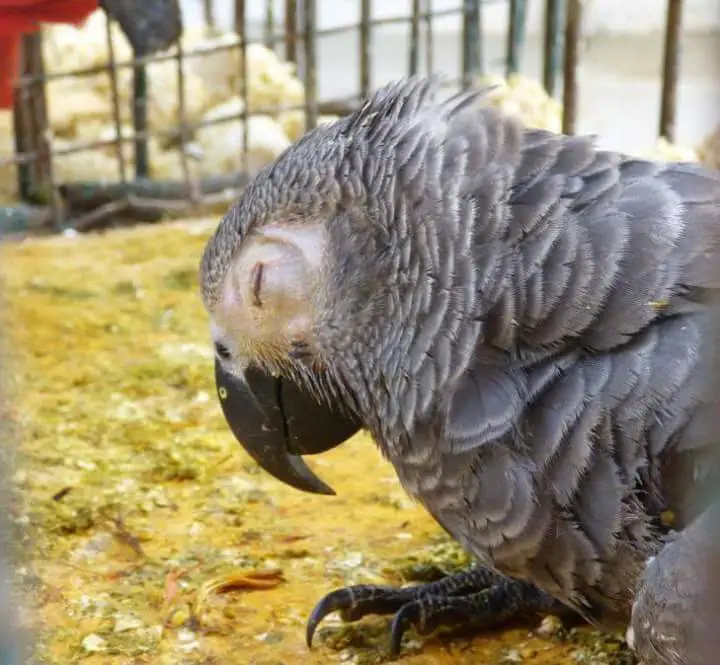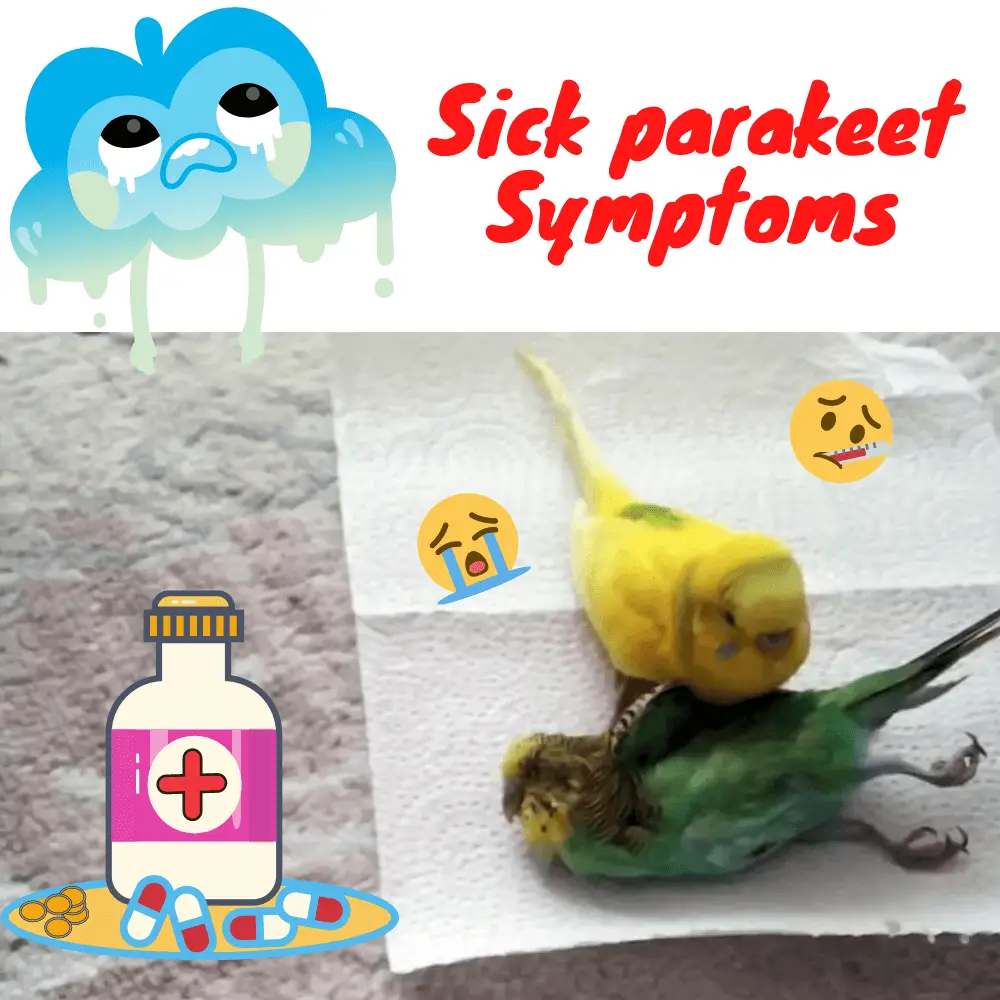
Sick parakeet symptoms: Can you judge the well-being of your parrot by its appearance? No!
parrots are gregarious animals and especially prey animals. Due to their gregarious status, the group takes precedence over the individual, and if a parrot is injured or sick, prey and gregarious instincts take over. Consequently, the group will hunt the hapless parrot to avoid attracting a potential predator. The bird thus banished, denied by the protective cocoon that is the group, is neither more nor less than an animal condemned to death!
So, the parrot will seek by all the tricks and all the means to camouflage as long as possible to the members of its social group the signs of distress or of disease which could be apparent!
There is no reason why he should not act the same way with you, since this behavior falls under two major instincts ( herd instinct and instinct of prey ) and, as we have already seen … the innate never disappears!
You need to be very vigilant about any physical or behavioral changes in your parrot!
Appetite
A bird’s rapid metabolism can become its worst enemy if it eats less than normal. Birds cannot be deprived of food even for a short period of time ( 8 to 12 hours ) without experiencing disastrous effects ( it is then considered an emergency ). If you notice a change in your bird’s appetite, it could be a sign that something is wrong.
Note: Check that he eats, by the stability of his weight. If in doubt, weigh it!
Note: It should be noted that most of the time unless you have a very careful eye (which is never the case), you will not notice the extreme thinness of our parrot because it will swell its feathers in order to hide its condition from us (and try to warm up). If the thinness is noticed with the naked eye, it is really a very big veterinary emergency!
Droppings
Any change in color or texture in the droppings can be a red flag ( unless of course Coco has eaten beets for dinner or had an orgy of fruit juice, you need to use judgment ). Check the number or quantity of stools; if the bird has not passed its droppings for 6-8 hours, it is an emergency!
The droppings of a parrot are made up of three parts.
- Fecal part – Green or brownish ( depending on the bird’s diet )
- Urate – White or cream
- Urine – Transparent
Sick budgie pictures
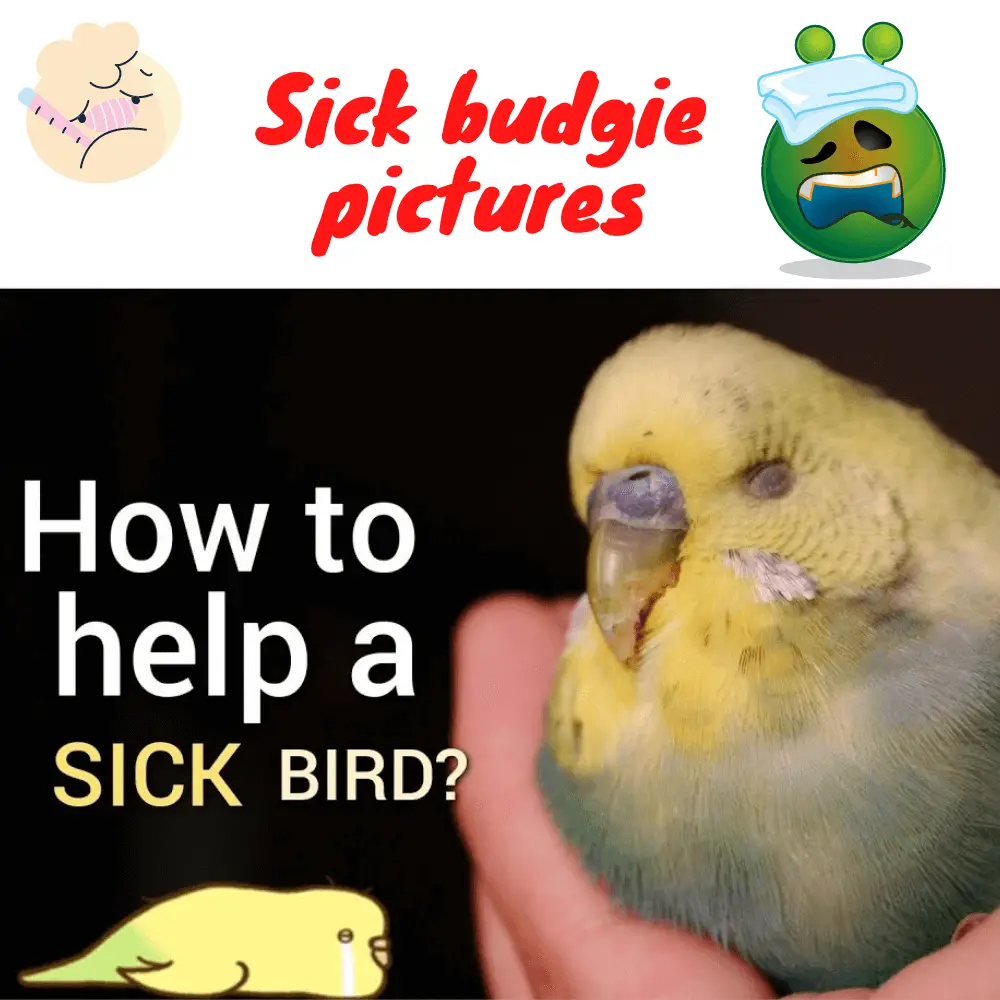
Sick parakeet symptoms
What should alarm us
Note: These are the symptoms of several pathologies that can be very serious. See a veterinarian quickly.
- Seeing blood in the stool ( red or black )
- Urates are yellowish or downright yellow
- There is a lot of urine ( polyuria )
- Undigested food in the droppings
The activity
A generally active bird that suddenly sleeps a lot, seems lethargic, or plays less can be a worrying sign ( unless the bird has gone to bed very late the day before or has had no time to a baby. afternoon nap. Here again, you have to use your judgment … ).
Changing behavior
A bird that changes its behavior. Normally cuddly and affectionate, he suddenly refuses to be approached or, conversely, a shy or fearful parrot who seeks your attention and lets himself be taken and cuddled.
The appearance
A parrot with swollen, disheveled feathers, half-closed eyes, perched on its two legs on the branch, or worse at the bottom of its cage is a sign of a serious problem.
The appearance of the feathers: This also gives an indication of the condition of the bird. A change in coloring or broken feathers can indicate infection or poor nutritional status.
Attitude
If the bird seems uncomfortable on its perch, if it cannot stabilize itself properly, it may be a veterinary emergency ( for example pododermatitis or kidney tumor in the parakeet ).
Breathing (dyspnea)
We are not supposed to hear a parrot breathe. If the breathing is rapid, noisy ( not to be confused with the asthmatic breathing of the pionus, which is normal in the latter when they are afraid ), the voice is changed or the bird seems short of breath ( it breathes with its beak open, the abdomen swells abnormally, the tail moves up and down as if the bird was ‘pumping’ its tail… sometimes difficult to see in short-tailed species such as the African gray ). It can be a sign of pathology, allergy, or aspiration ( food ). Coco needs to be seen by a vet urgently.
Dyspnea: difficulty breathing
Tachypnea: rapid breathing
Bradypnea: slow breathing
Other signs of respiratory problems: runny nose, the bird shakes its head, scratches its beak and nostrils, runny eyes, cough.
In the case of a visibly blocked nostril (cold or sinusitis, dried food or even dust), soften the secretions with a saline solution (Salinex) then, gently, aspirate the softened secretions using a 1cc syringe ( empty).
Note: Second-hand cigarette smoke, irritating odors, or airborne toxins can predispose to respiratory problems. Good ventilation, an air freshener (purifier) , and a humidifier will help the bird breathe better. Make sure that the filters of your air conditioners or furnaces (boilers) are changed regularly. A good diet must be offered, as certain deficiencies weaken the airways of parrots living in captivity.
Vomiting
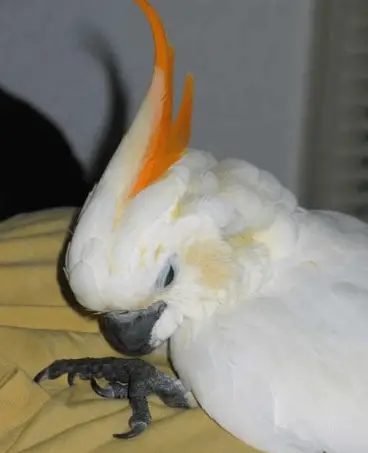
Sick parakeet symptoms
Do not confuse your bird’s emotional regurgitation with vomiting from an unwell bird. Coco regurgitates by moving back and forth with the head up and down. This behavior is generally healthy. Your bird is only celebrating your emotional connection. What comes out of his beak at this point is predigested food that is lumpy in consistency and not too fragrant ( depending on what he’s eaten ).
Coco vomits, shaking her head from side to side, and a viscous, sticky liquid escapes horizontally. A sign that the bird has vomited is when you discover predigested food on its head or body and/or it appears stuck with dry food, which makes it look ‘disheveled punk’. The vomit will have a ‘sure smell and the bird will show other symptoms such as fatigue, increased sleep, ruffled feathers, change in the appearance or amount of droppings, etc. In the case of vomiting, a medical evaluation is necessary. Blood tests, fluids, cytology, x-rays, and hospitalization will be necessary depending on the results of the examinations.
Bleeding
From the mouth, nose, or cesspool, or anywhere on the bird’s body.
Weightloss
Often very fast. Since parrots are known to be specialists in concealment, it is best to weigh the bird if its condition seems doubtful. Significant weight loss can indicate some condition that requires medical attention. It is sometimes difficult for the eye or the touch to assess the weight loss.
Very Important Note: No medicine for dogs, cats (or others), or humans should be given to the bird without the prescription of a veterinarian. Do not play the sorcerer’s apprentice, a drug not prescribed for a particular condition may do more harm to the bird or skew the results of a subsequent examination.
Sick parakeet symptoms
You have notably observed a loss of appetite, diarrhea, that he sleeps a lot or at unusual times, that he curls up, the nostrils run and/or with sneezing … For the signs of good health, see A healthy parrot?
There are several signs that your bird may be sick.
You must act quickly because a bird does not have “energy reserves”:
1 – Isolate your bird in a calm and warm room (but do not “cook” it near a radiator!).
Depending on the species, the normal temperature of a bird varies between 40 ° and 44 °. Your bird should be kept at an ambient temperature of around 27-28 ° C.
2 – Put aluminum foil at the bottom of its cage to collect recent and not soiled droppings.
3 – Make an appointment very quickly with your veterinarian so that he can establish a diagnosis and prescribe, if necessary, treatment.
The droppings will be kept at room temperature and will be brought in aluminum foil as quickly as possible to your veterinarian. The latter will thus be able to practice a bacteriological, parasitological, and fungal examination (search for fungi and mycoses)…
4 – The cage, all the usual toys, and/or objects must be disinfected with a specific disinfectant that your veterinarian may prescribe.
In general, here are some rules to follow:
– Contamination of the parrot (and of any captive bird) most often results from poor human hygiene (dirty hands and/or contact with other incompatible animals such as rodents, reptiles, insufficiently maintained cage) or spoiled or unsuitable food.
– No antibiotic treatment should be started before adequate samples and examinations have been carried out. The choice of antibiotic is a reasoned therapeutic act that must be left to the skilled person: the veterinarian.
Indeed, the excessive and systematic use of antibiotics can lead to the emergence of resistant bacterial strains and to the alteration of the bird’s immune defense capacities and only a professional can determine if it is necessary to prescribe an antibiotic and which one.
– For wild import parrots, know that most importers have taken the habit of putting birds systematically on antibiotics (antibiotics generally chosen from the most powerful).
Also, if an imported parrot “sampled from nature” develops an infection a few days after arriving at your home, you will understand why it is imperative to immediately consult your veterinarian: the infection that develops is due to a necessarily resistant “germ” to previous antibiotic treatment.
– If unfortunately your bird dies and you want to know the cause, the body must remain at room temperature and be deposited as quickly as possible (at most 48 hours maximum) with your veterinarian so that he can perform an autopsy.
If you have several birds, knowing the cause of death of one of them can help you set up a disease prevention policy.
Ask your veterinarian for a death certificate, especially if your parrot belonged to a protected species.
Related Post: Parakeet sickness
- Can My Parrot Be Covid-19 Infected
- Coronavirus disease COVID-19 from birds Parrot?
- Parrot Roundworm
- Parrot diarrhea treatment
- EGG binding
- Parakeet Sickness
- Sick parrot symptoms
- Proventriculus dilation syndrome in parrot PDD
- Parrot chlamydia
- Parrot health care
- Parrot Aspergillosis
- Why is my Parrot Fluffing
- Poisonous Foods for Parrots
- Chronic pecking: why is my bird tearing its feathers off
- Proventriculus Dilatation Disease
- Beak and feather disease
- PBFD: beak and feather disease
- Parrot Vet Near Me


